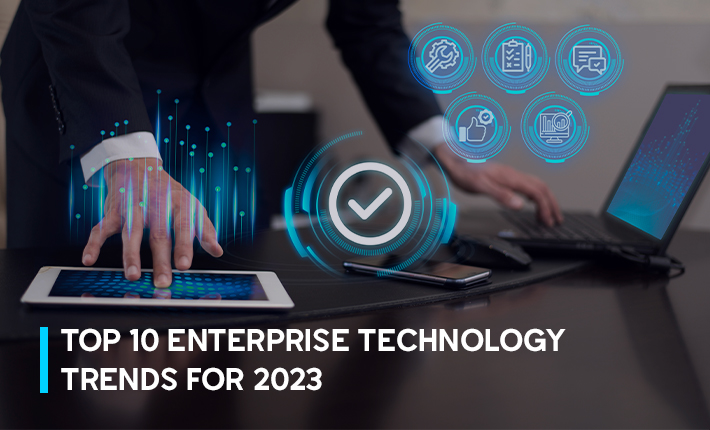As the digital landscape continues to evolve at a rapid pace, enterprises must stay ahead of the curve to remain competitive. In 2024, several key technology trends are set to reshape the business landscape, driving innovation, efficiency, and growth. This article presents the top 10 enterprise technology trends for 2024, highlighting their potential impact on businesses across industries.
Artificial Intelligence (AI) and Machine Learning (ML) Integration:
AI and ML have already made significant strides in transforming various industries. In 2024, their integration into enterprise systems will become more prevalent. AI-powered automation, predictive analytics, and natural language processing will enable organizations to streamline processes, enhance decision-making, and deliver personalized customer experiences.
Edge Computing:
Edge computing refers to processing data closer to the source, reducing latency and improving real-time decision-making. In 2023, the proliferation of Internet of Things (IoT) devices and the need for low-latency applications will drive the adoption of edge computing in enterprises. This trend will revolutionize data processing and analytics, especially in sectors like manufacturing, healthcare, and transportation.
5G Connectivity:
The deployment of 5G networks will gain momentum in 2023, bringing ultra-fast connectivity and low latency to the enterprise landscape. This technology will unlock new possibilities for real-time communication, remote collaboration, and the proliferation of IoT devices. Enterprises will leverage 5G to enhance productivity, optimize supply chains, and deliver immersive experiences.
Blockchain for Enterprise:
Blockchain technology, known for its security, transparency, and immutability, will find increased adoption in enterprise applications. In 2023, we can expect businesses to leverage blockchain for secure data sharing, supply chain management, smart contracts, and decentralized finance. Blockchain's distributed ledger capabilities will help enterprises build trust, streamline operations, and enable new business models.
Extended Reality (XR):
Extended Reality encompasses virtual reality (VR), augmented reality (AR), and mixed reality (MR). In 2023, XR technologies will gain momentum in the enterprise space, enabling immersive training, remote collaboration, and enhanced customer experiences. Industries like healthcare, retail, and manufacturing will leverage XR to revolutionize training programs, product visualization, and maintenance operations.
Cybersecurity and Privacy:
As digital threats continue to evolve, enterprises must prioritize cybersecurity and privacy. In 2023, organizations will invest heavily in advanced cybersecurity solutions, including AI-powered threat detection, zero-trust architectures, and encryption technologies. Privacy regulations like the General Data Protection Regulation (GDPR) and the California Consumer Privacy Act (CCPA) will drive enterprises to adopt robust data protection measures.
Quantum Computing:
Quantum computing, with its immense processing power, holds the potential to revolutionize various industries. While still in its nascent stages, 2023 will witness increased experimentation and exploration of quantum computing in enterprises. Sectors like pharmaceuticals, logistics, and finance will benefit from quantum computing's ability to solve complex optimization and simulation problems at an unprecedented scale.
Internet of Behaviors (IoB):
The Internet of Behaviors refers to the use of data collection and analytics to understand and influence human behavior. In 2023, enterprises will harness IoB to personalize marketing campaigns, optimize employee performance, and improve customer experiences. By combining data from various sources, including social media, IoT devices, and wearables, businesses will gain valuable insights into consumer preferences and behavior patterns.
Digital Twin Technology:
Digital twins, virtual representations of physical objects or systems, will gain traction in 2023. Enterprises will leverage digital twin technology to optimize manufacturing processes, monitor asset performance, and enable predictive maintenance. By simulating real-world scenarios, businesses can reduce downtime, optimize resource allocation, and improve overall operational efficiency.
Hybrid Cloud Adoption:
Hybrid cloud, a combination of public and private cloud infrastructures, will become the preferred choice for enterprise IT strategies in 2023. Hybrid Cloud Security Solutions are available in market for protect your hybrid cloud environments. Organizations will leverage the flexibility and scalability of hybrid cloud environments to optimize workloads, ensure data security, and enhance agility. This trend will enable seamless integration between on-premises infrastructure and public cloud services, empowering businesses to leverage the best of both worlds.
Conclusion:
In 2023, enterprises will witness a remarkable transformation driven by emerging technologies. Artificial intelligence and machine learning will revolutionize decision-making processes, while edge computing and 5G connectivity will enable real-time insights and collaboration. Blockchain will enhance transparency and trust, and extended reality technologies will reshape training and customer experiences.
As the digital landscape expands, organizations must prioritize cybersecurity and privacy, while exploring the potential of quantum computing and the Internet of Behaviors. Digital twin technology will optimize operations, and the adoption of hybrid cloud infrastructures will ensure flexibility and scalability.
Staying abreast of these top 10 enterprise technology trends for 2023 will allow businesses to harness their potential, gain a competitive edge, and drive innovation. Embracing these transformative technologies will enable enterprises to adapt to evolving customer demands, optimize operations, and pave the way for a successful future in the digital era.














Post Comments